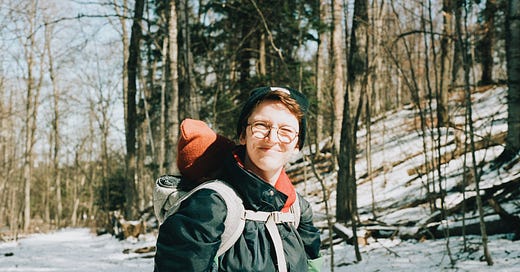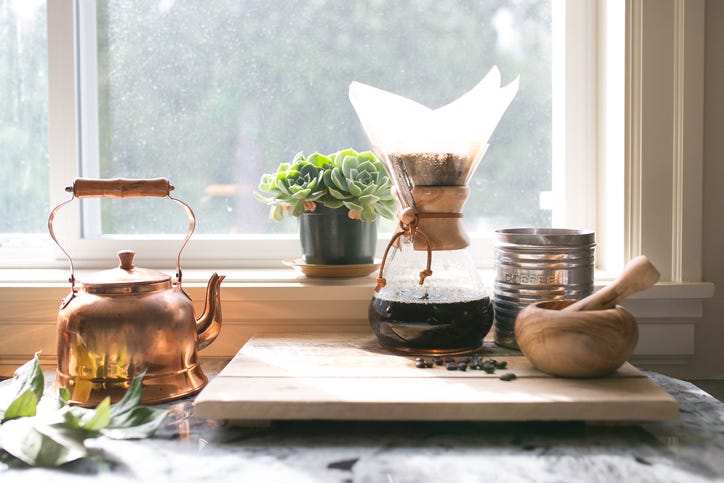Friends,
I have a very special post for you today. I’m welcoming my friend t.r.h. blue to share with us a gorgeous poem about home and being present to the spaces we find ourselves in. I hope you can settle for a second and spend some time with her words.
I started following blue under her poetry business notesontheway, on Instagram a few years ago. The tenderness and curiosity with which she writes is constantly inviting and invoking, two things that are difficult to find on the internet these days.
And today’s poem is about home, how we find it and ask what it means to us. It’s a poem that brings tears to my eyes when I read it, because I’m asking many of the same questions while living in the city. How is home sacred? How can we be honest about it?
Now, the poem, Meanwhile, I go:
Meanwhile, I go I moved to a home in the city, so I planted some trees, so I look to them often to stay rooted. This is what I know is true, that a beautiful walk in the city is still a beautiful walk; a beautiful home, still a beautiful home, only you have to work a bit harder to get your favorite birds to come, to love the ones already here. To love them it helps to know their names. The song sparrow is plain, poorly dressed, but oh can she sing. And it won’t be soon our young red maple can host their songs herself, but it will be. I am okay waiting because I must. Meanwhile, I go to the bakery, I go to the market, I watch my son touch flowers where he finds them, growing too from side yards, from window boxes, from bee gardens, from every little give in the old concrete.
Question & Response with the author:
I always wonder about the story behind a poem. Do you remember when, where, why you wrote these words, and what you hoped they’d speak to the reader?
We moved to Michigan about a year ago, into a house that is right in the middle of the city. Our house is on a tree-lined street in a charming neighborhood, but it’s still the city. I remember standing in my kitchen and looking out the window at a horde of noisy, hungry sparrows in my backyard, and just having this sinking feeling that I made a mistake moving here from our at least more-wild home in Nashville. That’s when this poem came to me.
As far as what I hoped they’d speak to the reader, I suppose in this case the first reader was me. I was wishing to love a place I felt very unsure of, and looking more closely felt like a good place to start.
“This is what I know is true,
that a beautiful walk in the city
is still a beautiful walk;
a beautiful home,
still a beautiful home,
only you have to work a bit harder
to get your favorite birds to come,
to love the ones already here.”
This is so beautiful and so true! I struggle with this as many of us do—how do we find contentment where we are? How do you hold space for future dreams and stay rooted to the spot you’re in?
I’m still figuring this out. It seems like every few months I find a new place in my body that has been hiding deep sensitivities, anxieties, pains, exhaustions. It was only this year I learned I’m autistic, and I think that is a major reason for both the discovery of those sensitivities, and the longtime disconnection from them. I made so many decisions about the life I have now without this key bit of information—living in a noisier, more populated place being among them. I’m still trying to discern what it is I can live with and learn to love, and what needs to change for me to have the peace I’m looking for. My sense of rootedness feels tenuous at best these days.
That said, here we are. And I’m doing what I can to be happy here. Gardening helps. I’m not very good at it, but the first day I spent out working in our garden was the first day I really felt like this house was mine. Something about tending to my own soil gave me a sense of love and connection to this place that I’d been needing. It’s a mutual sort of tending, I suppose!
“I am okay waiting
because I must.”
This line is so beautiful and so simple and so true. What is it about waiting? Is waiting a theme in a lot of your poetry?
I think, if I’m being truthful, writing that line was a statement of necessity more than honest acceptance. More “because I must” than “okay waiting.” Notice I didn’t write, “I am okay waiting / because I love slow-growing things and all the stages of watching a tree mature / and I appreciate that life takes a long time to become what it will be!” Hah! I am, to my disappointment, not that patient.
Contentedness, and the waiting involved in it, is certainly a recurring theme in my poetry, and that's because it’s something I struggle so much to hold onto. I dream of a home with big shade trees where I can hang bird feeders and watch cardinals come to nest. But I moved into a house with no trees at all, and I planted saplings. There is nothing I can do to speed them along. So wait I must! And I have to be okay with this.
This poem has a storybook feel to it, because it’s so descriptive, especially that last section. How is childlikeness leading you lately? What does being a parent teach you about curiosity?
I love the description of it having a storybook feel—that’s very much how the vision of it felt in my mind when I wrote it. Channeling a little of that opening song from Beauty & The Beast, perhaps. But it’s about that balance of having to wait for those trees to grow, work for those birds to come, and still seeing the charm of the simple things around me, and finding reasons to feel my heart can be full as I wait.
My son is a gorgeous little person. He’s not even two, and he just has this love for the world that moves me. He kisses the faces of flowers in our garden. He stands on a stool at the window and looks out, giggling at squirrels. He definitely illuminates the simple, forgettable beauty around us. It makes me want to look closer too.
The last two lines are so beauitful— “from every little give in the old concrete” and it’s so true! How can we stop and find the magic even in a crack in the concrete? Do you think as a society we are hungry for those moments, and do you think we even realize we are hungry? What’s distracting us from the simplicity we so desperately need?
God, isn’t this the question? Look, I mean, modern life is built to be distracting, to keep us moving and hustling and panicking about all we didn’t get done today. I think it’s an injustice. And a tragedy that we are missing so much even of the life that lives in our own yards.
I know we Americans like our tidy lawns with clean edges and homogenous grasses. But I can’t help but wonder at the wood sorrels growing through the cracks in our footpath—little yellow flowers, heart-shaped leaves, just springing up wherever they can. I can’t bear to cut it back, despite my neighbor’s not so subtle hints about effective weed-killers. Ha! I have a new fascination with leafcutter bees, which just delight me. They find gaps in rotting wood, in brick, in stone, and they build little nests of leaves there. Where there is room for it, I suppose, there will be life.
I think for us to offer healing—to ourselves and one another, to the earth, to the wood sorrels and leafcutters—we need to appreciate the tenacity of the living world, to honor its doggedness and creativity. And we need to empathize with it. We have this in common with nature, that we plant ourselves and somehow learn to grow and to open in these bizarre, unexpected, inhospitable places. I am watching my son put his roots in a loud, treeless place I’m not sure I should have chosen. But look at him growing anyway. Look at how beautiful he is as he does.
Look at our beautiful world, finding all these clever ways to carry on.
t.r.h. blue is a queer autistic Jew, a writer and a poet. She writes a newsletter called The Daylily here on Substack. It is all about the small, temporary things that make life meaningful. She’s also the creator of notesontheway, an unconventional poetry business where she sells art prints of her poems and writes custom poetry on commission.
blue’s poetry has been set for choirs, included in High Holy Day services and interfaith gatherings, and published in the award-winning Michigan Jewish History Journal. Her first limited edition poetry chapbook, The Stories You Told & Other Poems, came out this year.
blue lives in Michigan with her wife, Alex, and their son, Auden. When she’s not writing, you can find her walking, reading, cooking, or cutting back bindweed in her garden.






Sometimes it's about making home where you land, and appreciating the gift of being planted there. This poem makes me smile, and the interview is wonderful!
Wow. This poem and the intention behind it are so beautiful. What a gift. Thank you.